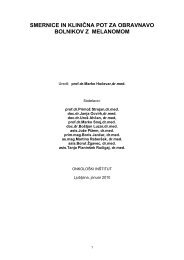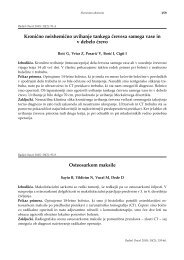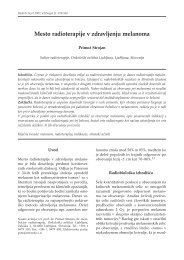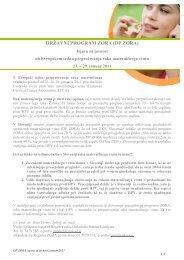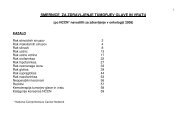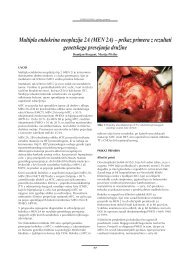Create successful ePaper yourself
Turn your PDF publications into a flip-book with our unique Google optimized e-Paper software.
The role of tricyclic drugs in selective triggering of<br />
mitochondrially-mediated apoptosis in neoplastic glia:<br />
a therapeutic option in malignant glioma?<br />
G. J. Pilkington 1 , J. Akinwunmi 2 and S. Amar 1<br />
1<br />
Cellular & Molecular Neuro-Oncology Group, School of Pharmacy & Biomedical Sciences,<br />
Institute of Biomedical & Biomolecular Sciences, University of Portsmouth, White Swan<br />
Road, Portsmouth PO1 2DT and 2 Hurstwood Park Neurological Centre, Haywards Heath,<br />
West Sussex RH16 4EX<br />
We previously demonstrated that the tricyclic antidepressant, Clomipramine, exerts<br />
a concentration-dependant, tumour cell specific, pro-apoptotic effect on human<br />
glioma cells in vitro and that this effect is not mirrored in non-neoplastic human<br />
astrocytes (Rooprai et al Acta Neurochirurgica: 145: 145-148 2003). Moreover, the<br />
drug acts by triggering mitochondrially-mediated apoptosis by way of complex 3 of<br />
the respiratory chain. Here, through reduced reactive oxygen species and neoplastic<br />
cell specific, altered membrane potential, cytochrome c is realeased thereby activating<br />
a caspase pathway to apoptosis (Daley et al 2005). Similarly, the tricyclic analog,<br />
desipramine, has also been reported to induce mitochondrially-mediated apoptosis<br />
in C6 glioma cells via increased caspase-3 gene expression and intracellular calcium<br />
homeostasis changes (Qui et al Acta Pharmacol Sin 23: 803-807, 20<strong>02</strong>). In addition,<br />
while we and others have shown that further antidepressants, including those of<br />
the selective serotonin reuptake inhibitor (SSRI) group, also mediate cancer cell<br />
apoptosis in both glioma and lymphoma, clomipramine appears to be most effective<br />
in this context (Meredith et al The FASEB Journal (2005; published online May<br />
2005). Very recently, Levkovitz et al J Mol Neurosci 27: 29-42 (2005) independently<br />
reported that clomipramine, in a comparative study between SSRIs and clomipramine<br />
22l9<br />
in C6 rat glioma and human neuroblastoma cells, caused apoptosis preceded by<br />
a rapid increase in p-c-Jun levels, cytochrome c release from mitochondria and<br />
caspase-3-like activity. Significantly lower sensitivity to the drug’s pro-apoptotic<br />
activity was demonstrated in primary mouse brain and neuronal cultures. The<br />
authors therefore concluded – as we had previously - that the high sensitivity of<br />
cancer cells to the drug suggested that clomipramine may have potential in the<br />
treatment of brain tumours. In addition to clomipramine we have investigated<br />
the possible pro-apoptotic activity of a range of further tricyclic drugs. Only two<br />
such agents (amitriptyline and doxepin) showed a similar, or better, effect when<br />
compared with clomipramine. Since both orally administered clomipramine and<br />
amitriptyline are metabolised to desmethyl clomipramine (norclomipramine) and<br />
nortriptyline respectively it is necessary for testing at a tumour cell level to be carried<br />
out with both the parent tricyclic and the metabolic product. In addition, reversal<br />
of multidrug resistance in a number of solid cancers following treatment with both<br />
clomipramine and amitriptyline has been reported. This additional role for tricyclics<br />
may, albeit at differing concentrations, be of some significance in the treatment<br />
of primary and secondary brain tumours. Since a substantial number of patients<br />
with malignant glioma have already received and are receiving clomipramine, both



